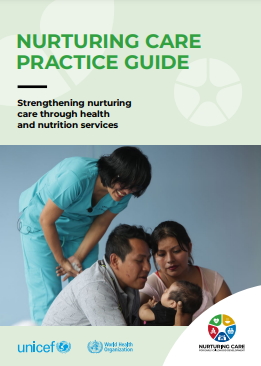The Nurturing Care Practice Guide is designed for managers and service providers who are responsible for or provide health and nutrition services for young children and their caregivers at any level. It responds to requests from practitioners and country teams who have learned about the Nurturing Care Framework and want to understand how to adapt health and nutrition services to be supportive of nurturing care and strengthen caregivers’ capacity.
With a focus on responsive caregiving, opportunities for early learning, safety and security, and supporting caregiver well-being, this Guide explores the rationale for giving greater attention to these four components; describes what managers can do to prepare services and better equip service providers; and includes practical suggestions for what service providers can do as part of
their ongoing contacts with families. Users may wish to read the sections in the Guide sequentially or go directly to the section that is of most interest.
This Guide does not replace skills training. All service providers are encouraged to complete training on one or more of the foundational packages. For those who have already completed one or more courses, this Guide can serve as a review and provide new ideas. For those without this training, this Guide serves as an entry point and provides the user with suggestions on how to start.
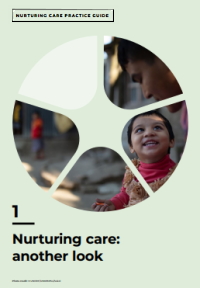 This section describes why nurturing care is important for children’s health and development. It focuses on the importance of strengthening caregivers’ capacity to provide nurturing care across all five components, highlighting the three components that are commonly less well supported through maternal, newborn and child health and nutrition services – responsive caregiving, opportunities for early learning, and safety and security. It also emphasizes the need to support caregivers to care for their children and maintain their own well-being.
This section describes why nurturing care is important for children’s health and development. It focuses on the importance of strengthening caregivers’ capacity to provide nurturing care across all five components, highlighting the three components that are commonly less well supported through maternal, newborn and child health and nutrition services – responsive caregiving, opportunities for early learning, and safety and security. It also emphasizes the need to support caregivers to care for their children and maintain their own well-being.
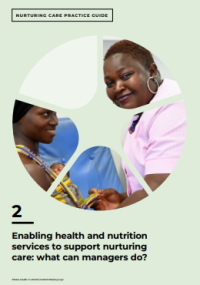 This section identifies what managers can do to reduce barriers and expand services to support nurturing care, build the skills of providers, and identify resources for more intensive support for young children with special needs. Concluding this section is a checklist of specific changes for managers to consider.
This section identifies what managers can do to reduce barriers and expand services to support nurturing care, build the skills of providers, and identify resources for more intensive support for young children with special needs. Concluding this section is a checklist of specific changes for managers to consider.
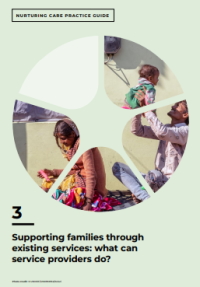 This section provides practical examples of what providers can do during their contacts with caregivers and children to better support caregivers, hear and address their concerns, and strengthen caregivers’ practices to care for their children. Suggestions are provided for antenatal care, postnatal care, out-patient well-child and sick-child care, inpatient paediatric care, and nutritional rehabilitation and support services.
This section provides practical examples of what providers can do during their contacts with caregivers and children to better support caregivers, hear and address their concerns, and strengthen caregivers’ practices to care for their children. Suggestions are provided for antenatal care, postnatal care, out-patient well-child and sick-child care, inpatient paediatric care, and nutritional rehabilitation and support services.
What providers can do
Below are excerpts from section 3, illustrating what providers can do to strengthen caregiver practices and support caregiver well-being in each type of service. When interacting with families, service providers can apply two to three suggestions based on the needs of the family.
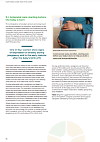 | 3.1. Antenatal Care Starting before the baby is born, antenatal visits are an opportunity to ensure all mothers and fathers can express their feelings about the baby’s arrival, bond with the unborn child, prepare the home environment for the baby’s arrival, and develop skills to prepare them for their parenting journey. |
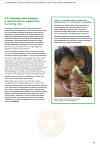 | 3.2. Postnatal Care From the moment of birth, postnatal visits are an opportunity to help caregivers form a relationship with their child, create a safe home environment, and care for their child during the vulnerable postnatal period. |
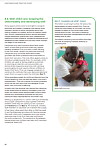 | 3.3. Well-child Care As children grow, regular check-ups are an opportunity to model and introduce caregiving practices that can keep the child healthy and developing well. They are also an opportunity for caregivers to share and get help with their concerns regarding parenting or their own well-being. |
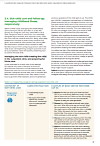 | 3.4. Sick-child Care and Follow-up When a child is sick, sick-child care and follow up is an opportunity to support caregivers to manage childhood illness responsively. Caregivers can be shown how to notice and respond to signs of pain, discomfort, or illness and asked how they are feeling and coping with their child’s illness. |
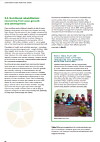 | 3.5. Nutritional Rehabilitation When children are undernourished, nutritional rehabilitation services are an opportunity to show parents how to feed responsively, introduce age-appropriate play activities, and problem-solve with the family how to access and prepare nutritious food at home. |
 |
Annex 1. Additional Reading on Nurturing Care This Annex provides a selection of materials for further reading on nurturing care to facilitate implementation of the Nurturing Care Framework. |
 |
Annex 2. Training Resources to Develop the Skills of Providers This Annex lists theoretically strong, evidence-based and tested training packages to support the skills needed to implement the suggestions in the Practice Guide. |
 |
Annex 3. Strengthening Nurturing Care and Support to Caregiver Well-being across the Three Levels of Support This Annex provides an overview of universal, targeted and indicated support and provides illustrative examples of how providers can support caregivers’ practices and well-being in the context of each level. |
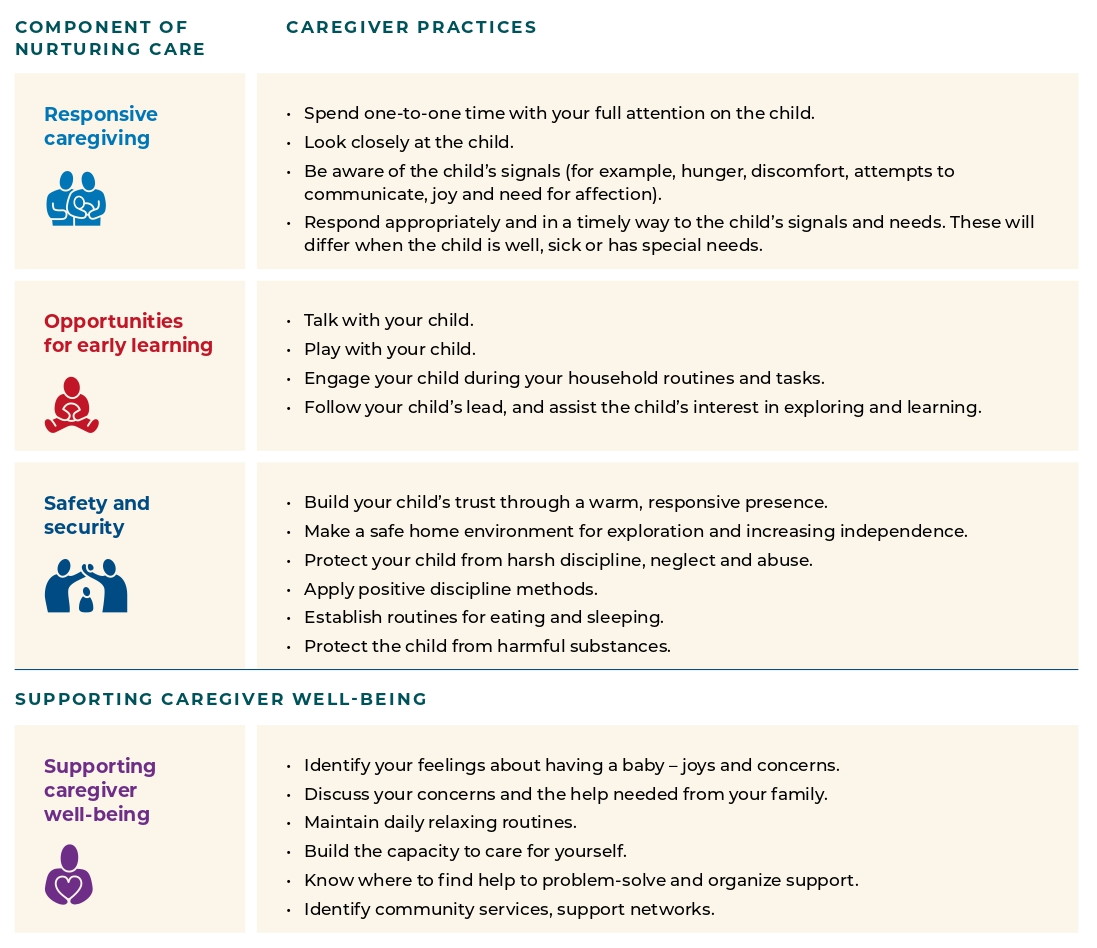 |
Examples of Caregiver Practices Related to Nurturing Care and Provider Support for Caregivers For caregivers to provide nurturing care they must master a number of caregiving practices. This Table selects just a few that, with support, enable caregivers to be more responsive, better recognize daily opportunities to help their children learn, and maintain a safe environment that protects the growing child. |
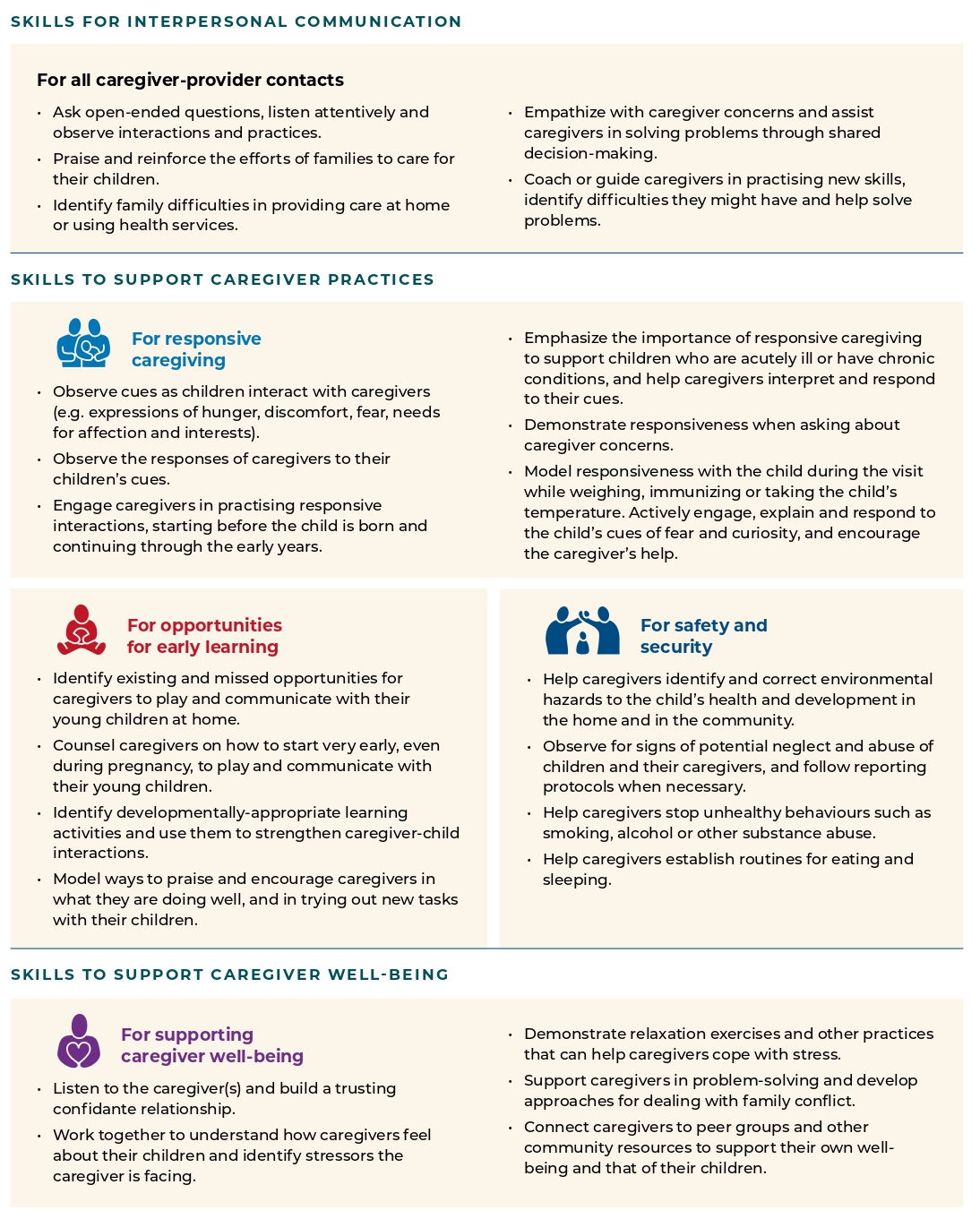 |
Skills Providers Need to Strengthen Caregiver Practices for Nurturing Care For service providers to focus on all components of nurturing care they require new skills, for example, to observe the quality of interactions between caregivers and their children, and to reinforce greater responsiveness. This Table lists the skills providers will require for interpersonal communication, to strengthen caregiver practices, and to support caregiver well-being. |
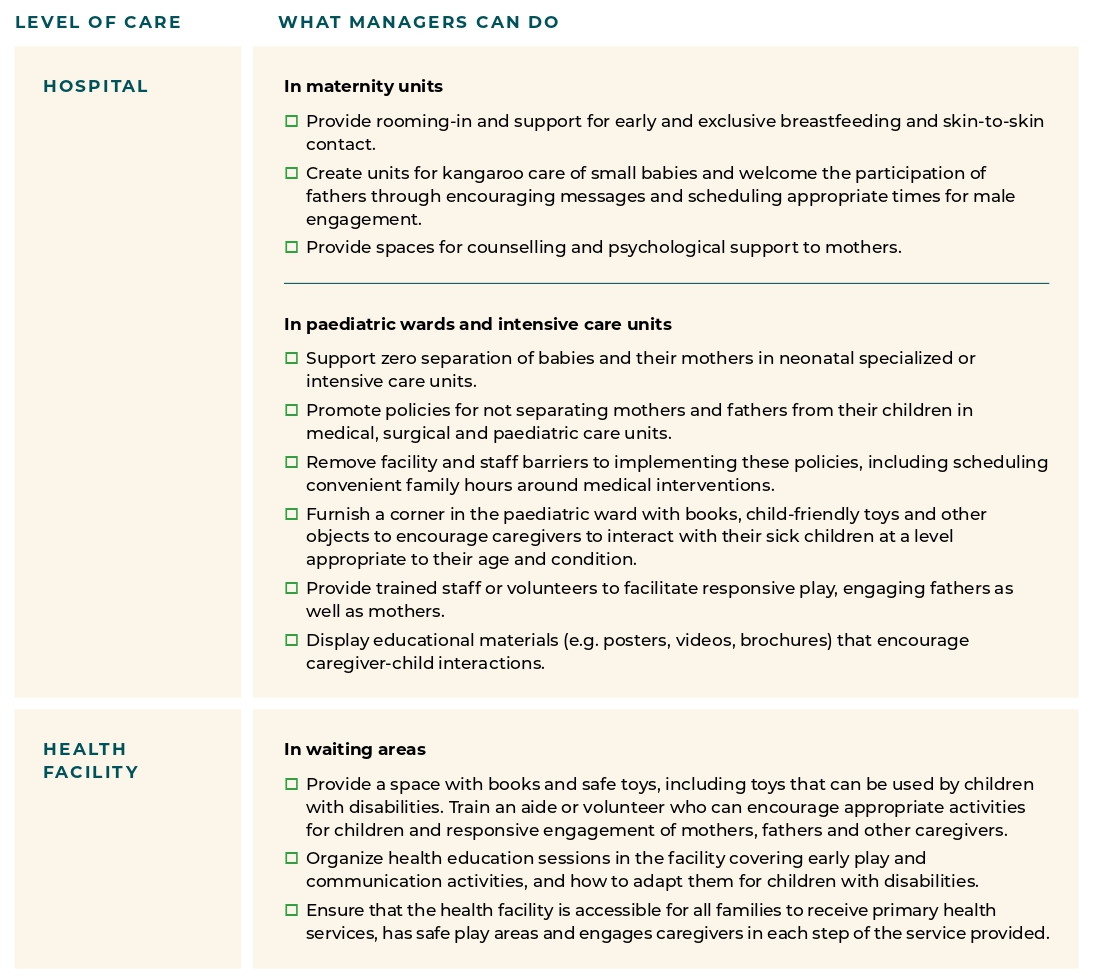 |
What Managers Can Do to Enable Providers to Strengthen Nurturing Care For service providers to focus on all components of nurturing care, they need support from their managers. This Table lists actions managers can take to enforce supportive policies, space, tools and time for service providers to work with families in hospitals, health facilities, community spaces, and humanitarian settings. |




